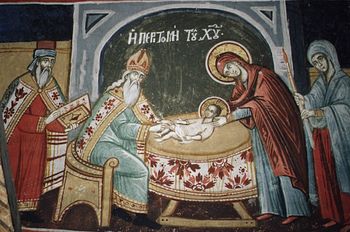Homily on the Day of the Circumcision of the Lord and Commemoration of St. Basil the Great
 “The Lord of all endures circumcision, and He circumcises man’s sins, for He is good.” This is the meaning of today’s Church feast. The Circumcision was established by God and commanded through Abraham to all the chosen people of the Jews. It was a sign of entering into the Covenant with God, the seal of the promise to be always in Obedience to Him from childhood, to be faithful to Him unto the shedding of blood. It was performed in the image of cutting off the fleshly passions, the circumcision of the hardheartedness of the very heart, which was so destructive for Israel and so often caused it to apostatize from its God.
“The Lord of all endures circumcision, and He circumcises man’s sins, for He is good.” This is the meaning of today’s Church feast. The Circumcision was established by God and commanded through Abraham to all the chosen people of the Jews. It was a sign of entering into the Covenant with God, the seal of the promise to be always in Obedience to Him from childhood, to be faithful to Him unto the shedding of blood. It was performed in the image of cutting off the fleshly passions, the circumcision of the hardheartedness of the very heart, which was so destructive for Israel and so often caused it to apostatize from its God.
And so our Lord, being sinless, Himself endured the circumcision in order to teach those hearts needing circumcision, the cleansing of a multitude of sins, to submit to the will of God; “The creator of the Law fulfills the Law”, so that He might show by His example that no one can come to God without the law of the Lord. When Christ the truth appeared, shadows and images disappeared, and circumcision was no more. Only His own shadow was no more, but what it reflected, of course, remained, for the Lord came not to destroy His law, but to fulfill it (cf. Mt. 5:17). Even now, through holy Baptism, just as through the circumcision, we take a vow to “renounce Satan and all his works”, and to “unite to Christ”, that is, to enter into a close, eternal union with Him, which is symbolized by circling three times around the font on the day of holy Baptism. There (in the Old Testament) the flesh is circumcised as a seal of the vow, but here we are to “cast off the body of sinful flesh”, that is, any sin that we have been carrying and to which we have become accustomed, as to worn-out clothing…
Could it be that Christ’s martyrs had to seal the promise of faithfulness to Christ with blood, but we have the right to triumph in their victory only on the feast of life’s pleasures; we, for whom the blood of Christ and His holy martyrs is spilled? Shouldn’t we be martyrs, if not by blood, then “by will”, like St. Basil, who considered exile, prison, and loss of property (if we can even imagine he had it), torture, and death itself to be nothing? We should demonstrate faithfulness to our conscience unto readiness to suffer “even unto blood”, so that like St. Basil we would “preserve our soul’s rank unenslaved”; that is, preserve our Christian calling unenslaved to passions of the world unto martyrdom, and not fall away from Christ at any pressure from the enemy powers upon our soul, as in war contemptuous traitors give in to the enemy at the slightest danger to their lives. After all, the circumcision of the heart, which was joined in the Old Testament with the spilling of blood, does not consist only in going to confession and verbally recounting or briefly writing down our sins and tearing them up with hands, but rather that instead of our garments we would rend our very heart (cf. Joel 2:13) with contrition and sorrow, and shed at least tears instead of blood over our continual falls away from Christ, Who redeemed us with His blood.
Let us take care, brothers, in celebrating the appearance of God in the flesh, so that our dedication to Christ would exceed the dedication to God of the Jewish people, which consisted in the external works and words of the scribes and Pharisees (although our righteousness is far from the righteousness of the latter), because if it does not exceed it, and if we do not circumcise our heart of the passions, then we cannot enter the Kingdom of Heaven (Mt. 5:20).
Source: Pravoslavie.ru

